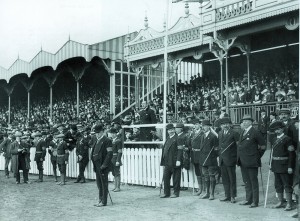Old English Catholic background
Published in Issue 4 (July/August 2014), Volume 22
Sir Edward Carson addressing an Ulster Volunteer Force rally in July 1913. Nugent felt deeply uneasy with the ‘Ulster’ identity of the organisation, renaming his division the ‘Cavan Volunteer Force’. He deemed the CVF a police rather than a political force, formed for ‘defence and not aggression’. Retrospectively, Nugent felt profoundly uncomfortable with his involvement in the UVF.
‘We are not really a N[orth] of Ireland family and as a matter of fact, the Nugents were for James and against William in the days when the North was founding itself. All our family associations lie in the midlands of Ireland and it is merely a geographical accident that we live inside Ulster.’
This inherent sense of belonging would colour his turbulent relationship with Ulster unionism during the Great War.
Related to the Lords Delvin of Westmeath, the Nugents formed part of a long-established tradition of Old English landholding in County Cavan. This dynastic link remained an object of inordinate pride, so much so that the family ensured that each birth was recorded and connected via a direct genealogical line to Christopher, 14th Baron Delvin (1544–1602). The Nugent family estate was relatively untouched during the Ulster Plantation, and although the Cromwellian land confiscations drastically reduced their holding, they managed to evade the rigours of the Penal Laws by converting to the established church following the Williamite wars. By the second half of the eighteenth century they had become committed Anglicans and a fully integrated part of the Protestant Ascendancy.
















